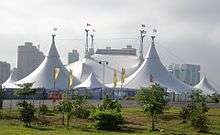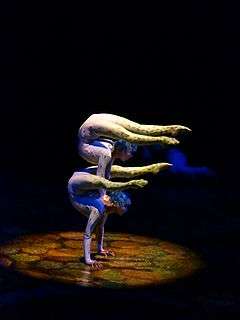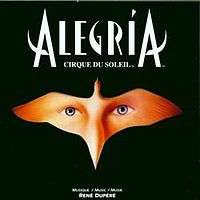Alegría (Cirque du Soleil)
Alegría is a Cirque du Soleil touring production, created in 1994 by director Franco Dragone and director of creation Gilles Ste-Croix.
| Alegría | |
|---|---|
 Logo for Cirque du Soleil's Alegria | |
| Company | Cirque du Soleil |
| Genre | Contemporary circus |
| Show type | Touring arena show |
| Date of premiere | 21 April 1994 (Montreal) |
| Location | Montreal |
| Creative team | |
| Director | Franco Dragone |
| Director of creation | Gilles Ste-Croix |
| Composer | René Dupéré |
| Costume designer | Dominique Lemieux |
| Set designer | Michel Crête |
| Choreographer | Debra Brown |
| Lighting designer | Luc Lafortune |
| Sound designer | Guy Desrochers |
| Company founder and CEO | Guy Laliberté |
| Make-up designer | Nathalie Gagné |
| Other information | |
| Preceded by | Mystère (1993) |
| Succeeded by | Quidam (1996) |
| Official website | |
It was one of Cirque du Soleil's most popular touring shows. Since it premiered in April 1994, it has been performed over 5,000 times and seen by over 14 million spectators in more than 250 cities around the world. Alegría originated as a touring big top show. However, beginning with its 2009-2011 North American tour, the show was converted to an arena format, enabling it to visit cities that were previously inaccessible to the big top tour. Furthermore, Alegría took a short respite and was converted to a resident show at MGM's Beau Rivage casino from May 1999 to October 2000 before it continued touring again. On 29 December 2013, Alegría performed its final show at the Lotto Arena in Antwerp, Belgium.
Alegría takes its name from the Spanish word for "joy." Cirque du Soleil's literature describes the show as "an operatic introspection of the struggle for power and the invigorating energy of youth." Dominique Lemieux's costumes evince a baroque aesthetic of decadence and ornamentation, while René Dupéré's musical score features a unique blend of French, Spanish, African, and Mediterranean influences. The stage and props are characterized by gothic arches and harsh angular designs.
In 2019, Alegría has been remounted in a revamped version. "ALEGRIA in a new light", had its launch on 18 April 2019, in Montreal, Quebec.

Acts
Acts in the show included:[1]
- aerial cube
- contortion
- fast track
- fire
- flying man
- handbalancing
- high bar
- juggling
- manipulation
- power track
- Russian bars
- shoulder pole wire
- slackwire
- strong man
- synchro trapeze
- tightwire
Costumes

Alegría's costumes have a dichotomy relating to the Old Order and the New Order. The Old Order has costumes which are reminiscent of New York's Gilded Age as they are finely decorated with feathers, lace, and other adornments. The New Order, on the other hand, representing the youth of tomorrow, have the same rich hues as the old order, while the fabrics used are lighter and softer, helping to emphasize the agility of youth.[2]
Music

The soundtrack was composed by René Dupéré, who had composed for previous productions including Nouvelle Expérience, Saltimbanco and Mystère.
It was released as a studio album on 27 September 1994. Robbi Finkel and René Dupéré were nominated for a Grammy Award as Best Arranger at the 38th Annual Grammy Awards. The album was also nominated for several Félix Awards in 1995, winning two of the latter: 'Producer of the Year' for Robbi Finkel[3] and René Dupéré, and 'Sound Mixer of the Year' for Rob Heaney. Alegría was also ranked on the Billboard World Music Chart for 65 weeks.
The tracks for the original 1994 release, including the two extended tracks from 2002 are listed below and alongside are the acts during which they are played.[4]
- Alegría (Finale)
- Vai Vedrai
- (Synchronized trapeze)
- (Trapeze Duplex) (2007-2010)
- Kalandéro
- Shoulder-Pole Wire (1994-1995)
- Tightrope (1996, 2004)
- Juggling (2002 - 2004, 2006 - 2013)
- Slackwire (2004 - 2005)
- Querer (Interlude to Aerial high bar)
- Irna (Power track)
- Taruka (Contortion)
- Jeux d'enfants (Power track setup)
- Mirko (Opening)
- Icare (Aerial high bar)
- Ibis
- Aerial Cube (1994 - 1995, 1997 - 1999, 2004 - 2008)
- Flying Man (1996 , 2003 - 2004)
- Valsapena (Power track)
- Nocturne (Snowstorm)
- Cerceaux (Manipulation)
- Malioumba (Flying man) (2001-2013)
Other songs
- Milonga (Introduction to musicians)
- Ouverture (Pre-Opening sequence)
- Prelude to Vai Vedrai (Pre-Trapeze act sequence)
- Fleurs (Clown act) (1997-2000, 2002-2004)
- Le Feu (Fire-knife dance)
- Homme Fort (Strong man) (1994-1999, 2001-2004)
- Danze Vazoule (Le bal)
- Ombre (Clown act) (1994-2004)
- Force 4/Balafon (Russian bars)
- La Perche 1 (Shoulder-pole wire) (1994-1995)
- La Perche 2 (Shoulder-pole wire out sequence) (1994-1995)
- Prelude to Le Cube (Pre-Aerial Cube act sequence) (1994-1995, 1997-1999, 2004-2007)
- Prelude to Contortion (Pre-Contortion Cube act sequence)
- Grands Volants Prelude (Pre-High Bar act sequence)
- Sisyphe (Handbalancing) (1995-2013)
- Rinalto Vera (Cyr wheel)
- Bardak (Clown act and Juggling) (1994-1996, 2005)
- Oiseaux sur la corde (Clown act) (1994-2004)
- Concierto de Aranjuez (Clown act) (1994-1996)
Tour
Alegría's tour history[5] is quite extensive as it premiered in 1994. Since it began it has toured under the Grand Chapiteau as well as in sporting arenas. Additionally during 1999 and 2000 it played as a resident show in Biloxi's Beau Rivage. After 19 years of touring, Alegria performed for the last time in Antwerp, BE on 29 December 2013.
Remount
In commemoration of the show's 25th anniversary, a new show called Alegría: In a New Light was created, in its original Big Top format to pay tribute to the original show. The tour began on 18 April 2019 in Montreal. It will feature revamped numbers, characters, costumes, music and makeup.[6]
References
- "Alegría Acts". Cirque Tribune. Archived 3 November 2008.
- Clément, Ronald (2009). Cirque du Soleil 25 Years of Costumes (in Chinese, French, and Japanese). Canada: Dépôt légal, Bibliothèque et Archives Canada. pp. 34–39. ISBN 978-2-9803493-4-8.
- RobbiFinkel. "Robbi Finkel's website". Retrieved 19 January 2008.
- "Music - Alegría". Cirque Tribune. Retrieved 24 March 2011.
- Cirque Tribune Alegría Schedule
- https://translate.google.com.au/translate?sl=auto&tl=en&js=y&prev=_t&hl=en&ie=UTF-8&u=http%3A%2F%2Fwww.journaldemontreal.com%2F2018%2F04%2F25%2Fpour-son-25e-anniversaire-alegria-sous-chapiteau-en-avril-2019&edit-text=&act=url